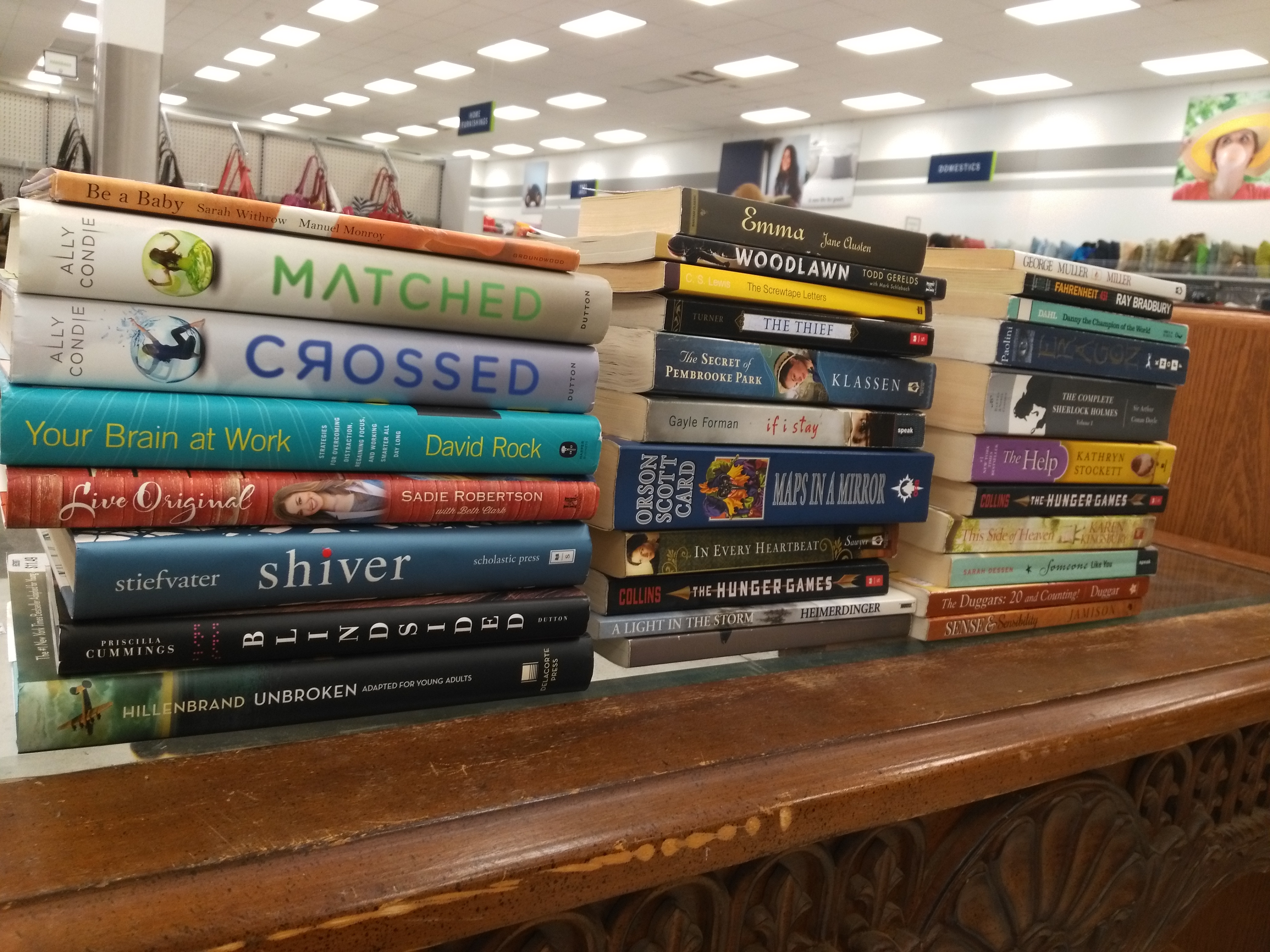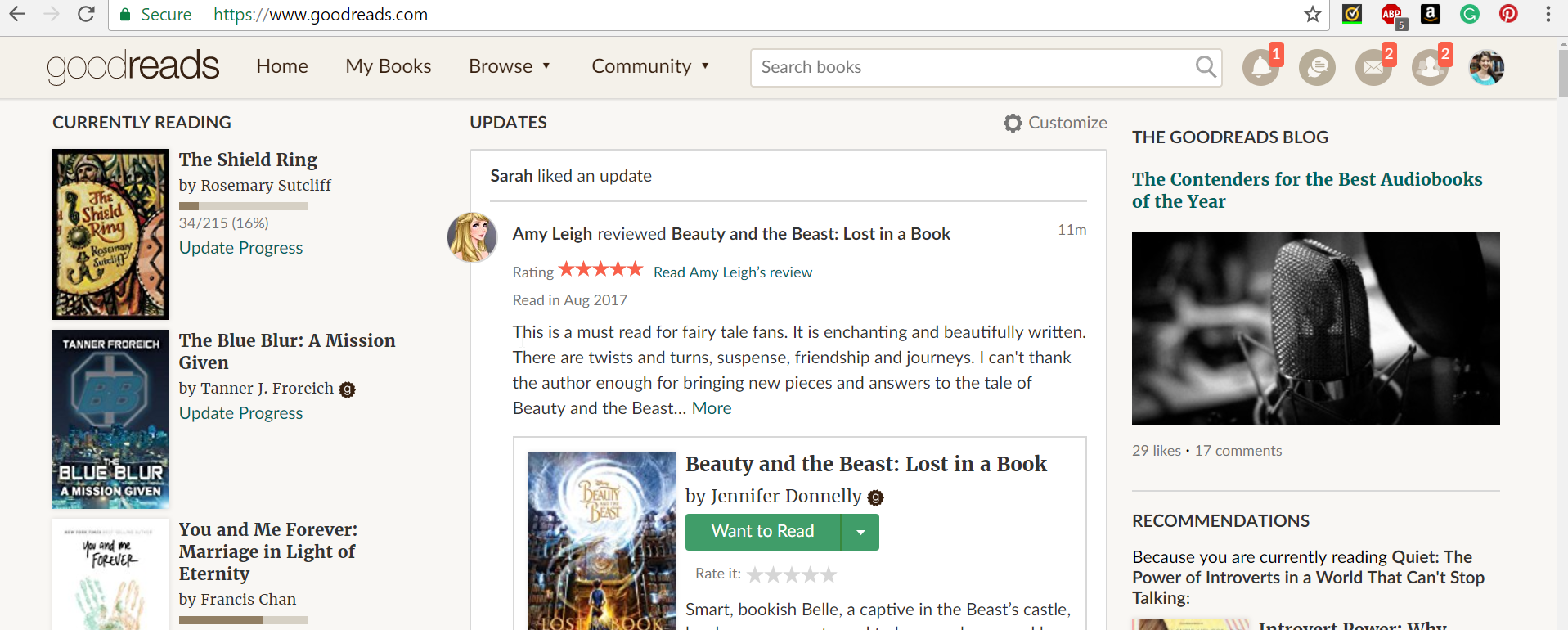I took a book census the other day, and, out of the 100 or so books I have out on my shelves and around my room, forty of those are secondhand. I love buying used books, mainly for budget reasons, but it’s also fun to give new life and a new home to overlooked copies that are still quite readable. 😉
I’ve bought many of my books used on Amazon, through a Christian fiction Facebook group (recent discovery!), and even through store credit at a used bookstore, but nothing beats the thrill of a thrift store book hunt. 😀
I got to go thrift shopping for books the other day, and my very patient family let me take as much time as I wanted. 😀 I documented the trip, so this post is half you-can-do-this-too tips and half look-what-i-found crowing. 😉

Just part of my thrift store’s HUGE book section.
Step #1: Look at everything everywhere.
At least with my local thrift store, the book section isn’t organized, so cookbooks and novels, children’s books and classics, hardbacks and non-fiction are mixed together. I try to at least glance over every shelf just to ensure I’m not missing any treasures.

Tip: If you have a lot of hair like I do, put it up because it’s gonna get really messy from the rigors of bookshelf browsing. I forget this every. single. time. 😛
A prime example of this is how I often neglect the top shelf because of my height but also that’s where they tend to put the mass market pulp fiction I’m not usually interested in. But this time, I followed my own advice and looked at everything and saw…

A copy of Jane Austen’s Emma! So yeah, really do look at everything. Unless time is limited. 😉
Step #2: Pull first, ask questions later.
If a book looks even remotely interesting, pull it off the shelf. There will be time afterward to look at each book more closely. I pull by author name (“I think I recognize them?”), hype (“Oh, everyone on Goodreads was talking about this!”), and general interestingness of cover and synopsis (“Oooo, shiny!”).

Tip: Get a cart. I also always forget this.
When I went on this shopping trip with this post in mind, I had no idea I would find so many books! A cart from the start would have been really helpful, but I didn’t expect to need one so I walked around looking like a crazy person for a while. 😉 The stack eventually got too tall for me to carry, so I left it on the floor near me while I finished looking at all the shelves.

Yes, that is thirty books. Yes, I am crazy.
When I got in a predicament over how to carry them all over to my family’s cart, a kind stranger–a soft-spoken veteran–volunteered to carry the towering stack over to it for me. He was even gonna carry it to the front of the store where the registers were if I needed it. He was pretty cool. 😉 ❤
Step #3: Cull through your stack.
Find a nice place (like maybe a cart?? If you got one…) to sort through your books. I chose a nearby coffee table and stacked my haul on it, then started looking at them more closely.

So many books!
My first step in vetting a book is to look it up on Goodreads and read friends’ reviews. I suggest having a charged, portable device on hand for this part. 😉 Many of my friends have the same reading tastes and content concerns I do, so this always helps me get a good idea about whether or not I will enjoy a book. 😉

One of the books I looked up. ^^
After this step, I look at the book’s condition and see if it’s worth bringing home. I didn’t do a good job of this with one I bought last month, and I recently discovered it is both written in and smells strongly of perfume, so I have a lot of work to do on it before it can go on my shelves. 😦 If there are multiple copies of something, I suggest grabbing both so you can compare them and choose the one that is in better condition.

The Hunger Games is so popular, I don’t think these were even the only two copies! XD
Sometimes I’ll see a book that looks really interesting, but I’m not sure I’m ready to own it yet and would rather try it from the library. If it’s not on my Goodreads to-read list, I’ll add it there so I won’t forget it, then say a temporary goodbye to its loveliness.

*needs another library trip*
After this, I check my interest in a book, check how much I’m willing to spend, and fight with myself over whether or not I need a hardback copy of a book I already own… This is the stack of books I left behind and reshelved with the help of a younger sister. 😉

Goodbye beautiful copy of Matched!
And this is the stack I decided to buy…

At the last minute, I reshelved the George Muller biography for budget reasons. 😉
Woodlawn by Todd Gerelds is a biography about the events of a movie I recently enjoyed. I liked that it has historical pictures in it, and I’m looking forward to reading more about these people beyond just what the movie portrayed. 😉 Blindsided by Priscilla Cummings looks like a very interesting story of a teenage girl who loses her sight. I don’t know very much about it, but I deemed it worth a try and the unique, beautiful cover is a nice bonus. 😉 Unbroken: An Olympian’s Journey from Airman to Castaway to Captive by Laura Hillenbrand is actually an adaption of her novel for young adults, and I’m glad to have found it since, while I’m interested in the life of Louis Zamperini, the movie and the adult book are a bit too much for me. I read some reviews and discovered that this version is cleaned up on the language and violence (at least somewhat), so I’m hoping to be able to read it. 😉
Step #4: Buy your books!!! 😀
And don’t forget to gawk over the deals you got and remind yourself that the money you saved means you can buy more books (or keep saving it).
Step #5: Freeze your books for 3-4 days.
Not to freak anyone out, but used books can sometimes harbor bugs/bug eggs. A few days in the freezer has been proven to nuke those little beasties! I’ve never had problems with this in used books (to my knowledge), I just do this as a precautionary thing. 😀 Tie your books up in a bag and pop them in the freezer in a safe, dry spot, then mark on the calendar when to get them out.

Or forget about them like I do and suddenly be surprised one day with new reading material. 😛 😉
Step #6: Make your books even more beautiful.
Pull your books out of the freezer and let them warm up a little bit. If you’re concerned about pages warping, set a heavy dictionary on top of them for this part. 😉 When they are at room temperature, I like to look them over and erase any pencil markings inside, wipe any spots off the covers with a damp paper towel or alcohol swab, and remove all price tags. This time around, my copy of Unbroken had two price tags on it–one from the original bookstore and one from the thrift store, so I’m glad I had an alcohol swab to help remove all the stickiness.

Isn’t Blindsided gorgeous?!! That braille is actually embossed so you can feel it. ❤
Step #7: Welcome your books home.
Your books are ready to take their place on your shelf (or to-read stack) with all of the others! Mine won’t officially take their place on my shelf until I’ve read them, but right now, here they are with some of my other books. (And yes, the ones right next to them happen to be secondhand!)

I had a great time thrift shopping, and I’m excited to try out these new books. ❤
Do you like buying books secondhand? Share your tips and stories with me in the comments. 😉
Thanks to Anna for taking these pictures for me, and my family for helping me shop and reshelve. 😉










































